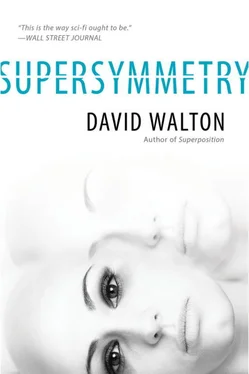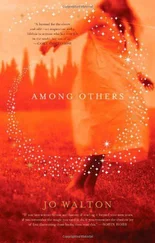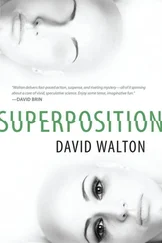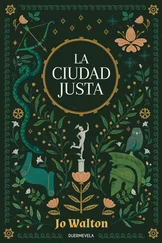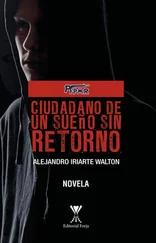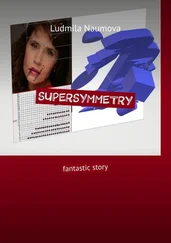David Walton
SUPERSYMMETRY
To Karen
My theory of everything
Jacob Kelley spent the last minutes of his life at a baseball game. He hadn’t been to Citizens Bank Park in years, not since his children were young, and he reveled in the vivid hue of the brightly lit Kentucky bluegrass, the low roar of the crowd, the squeak of hinged seats, and the smell of popcorn and beer. The stadium was aging now, no longer the sparkling novelty it had been in his youth.
In the eighth inning, the Phillies took the lead with a three-run homer. With the best closer in the league warming up in the bullpen, the rest of the game wasn’t much more than a formality. Jacob considered leaving early to beat the traffic, but it wasn’t often he came out to a game. He wandered off to find a pretzel and a beer instead.
It was strange to be alone. Baseball was a much different experience without kids along, chattering and begging for treats and poking all the chads out of their all-star ballots. But the kids were all grown up now. He had tried to convince the twins to come with him, but Sandra was on patrol and Alex was working hard on an upcoming demo. Claire lived on the West Coast now, with her own family, and Sean was in the Marines on overseas assignment. It was sad when a family started breaking up, each child finding a different place in the world, but he supposed it was inevitable.
He had to admit he was enjoying himself, even without them. The game was close, and it was a good crowd—41,528, according to the big screen. He could leave behind his worries about Alex and Sandra; there was nothing in the world but the crack of the bat and the soft collision of ball and glove. Baseball was a clean sport, precise and mathematical. Jacob was a physicist, or had been before he switched to teaching, and the analytical nature of the game appealed to him. It was sports boiled down to pure numbers.
Jacob took a bite of his pretzel and sighed. He was going to have to tell them. He should have told them already, but it had never seemed like the right time, and somehow, one or the other of them always had an excuse that kept them from coming to the house together. He wanted to tell both of them at once, since it affected them both. He would have to call and insist that they come together. Maybe next weekend they would be free.
On the way back to his seat, Jacob stopped short. He knew something was wrong before his mind could even process what it was. The space over his seat was contorting, changing shape, refracting light like a huge drop of water. He had seen it before, but it wasn’t supposed to happen again. Not here. Not now.
He dropped his pretzel and cup, heedless of the beer splashing on the concourse, and backed away, unable to tear his eyes away from the distorted space over his seat. The wrongness grew, bending the metal and plastic around it like light through a lens. Other people started to notice. Fans pointed and shouted, and those sitting nearby scrambled to get away.
It expanded rapidly in a sphere, silently warping everything in its path. A woman who was slow to get away screamed as her leg was caught, and then she herself was enveloped. People started to panic then, everyone pushing and shouting and shoving to get to the stairs. Jacob turned to run as well, though he knew it would do no good.
The distortion grew larger. Everything nearby seemed to be stretching and curving away. Without warning, the growing sphere sucked back into nothing. This is it , Jacob thought. I’ll never see my children again. There was a bright flare of light, and then the whole stadium tore itself apart around him.
It would be the disaster of their generation, like the fall of the Twin Towers or Kennedy’s assassination. Sandra Kelley was one of the early responders, one of the first to see the stadium lying crushed, torn apart as if by an angry giant. She was less than two years out of police academy, a junior officer still doing patrol on the night shift. She had seen victims of traffic accidents, so she wasn’t entirely green, but nothing could have prepared her for this.
It seemed as if every police car, ambulance, and fire truck in the city had been routed to Broad and Pattison, but it wasn’t nearly enough. There had been a Wasted Euth concert at Lincoln Financial Field that night, so there were crowds of gawkers to control, and the number of injured in the parking lot alone was more than they could handle. Debris lay scattered everywhere.
Most of the light poles in the parking lot were still intact, but the stadium wreckage itself was dark, an unexpected hole where once 2000-watt lights had blazed out into the night. The sky was overcast, a brooding bank of clouds that hid the stars and seemed to press down on the city.
Sandra dialed her dad’s phone for what must have been the tenth time. The call went straight to voice mail, just like every other attempt. Her voice was shaking badly. “Dad, please call. Please get this. Tell me you weren’t at the game.”
She called her mom’s phone next. No answer. She had left three messages already, but she left another one anyway. “Mom, it’s Sandra. Please call. Dad was there, wasn’t he? He had tickets. I don’t remember when, but I think it was tonight. He invited me, but I was on duty…” She choked on the words and clicked off.
She weaved her way around battered blue plastic seats, strewn across the parking lot alongside unrecognizable pieces of mangled metal and concrete. There were bodies, dozens of them. Some of them were whole. Others were not. She stopped, doubled over, and vomited on her shoes.
Her sergeant took one look at her face and pointed her toward crowd control. Facing away from the stadium as much as possible, she and a dozen other cops shouted people back and strung police tape to cordon off the whole area. The first moment she could, she pulled her phone out of her pocket and called her parents again. Nothing.
“Here.” Another cop pushed a water bottle into her hands. It was Nathan, from her class at the academy. She took the bottle gratefully, swished some water in her mouth, and spat it onto the pavement. It cleared some of the taste of vomit from her mouth, but not the acid taste of fear. She felt jittery and light-headed, like she was on some kind of uppers or a massive dose of caffeine.
“Thanks,” she said, handing back the bottle.
“Keep it,” Nathan said. He was blond and tall, with athletic good looks. The uniform fit him well. She had had a bit of a crush on him back in the day, but he had fallen for a cadet named Danielle instead, and they’d married a week after graduation.
Sandra tried her phone again, but with no result. Nathan studied her face. “You know somebody who was here?”
She nodded, swallowing hard. “My dad. He used to take us all the time, when we were…” Her voice cracked, and she pressed her lips together, holding back tears.
“They’ll find him,” Nathan said. “Don’t give up hope.”
She smiled as best she could and nodded her thanks. Heavy earthmoving and construction equipment rolled in, bulldozers and front-end loaders and cranes. Her sergeant pulled her back to help with search and rescue. There were people trapped under eighty-ton blocks of concrete, but no one seemed to agree about the best way to move them safely. She found herself in crews of strangers, moving what rubble could be moved by hand. She was tired, bone tired, but she knew she couldn’t stop. People’s lives depended on the work she was doing. And one of them just might be her father.
Читать дальше
